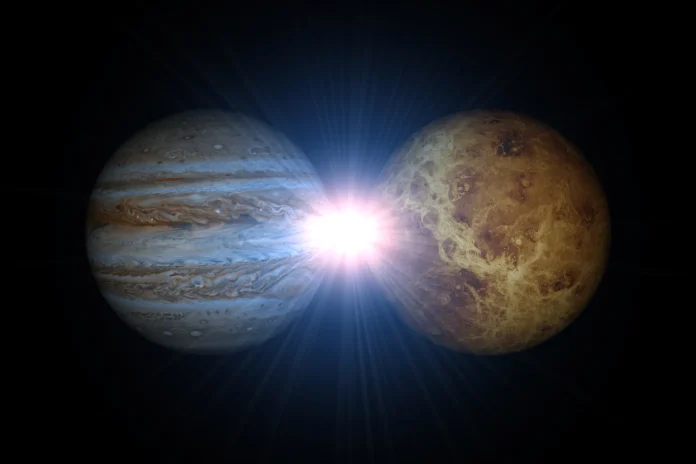Venus, the boiling neighbor of Earth, is a lifeless wasteland with very little atmospheric water vapor. Given the similarity in size and mass between Venus and Earth, scientists have been puzzled by the question – does Venus have water, and if so, where did it all go? Venus is extremely dry, and a new study by scientists at the University of Colorado Boulder explains why.
Does Venus Have Water?
The research, published in the journal Nature, utilizes computer models to examine how Venus loses water through a process known as “dissociative recombination.” Hydrogen atoms in Venus’ atmosphere flee into space during this process. According to the study, this process eliminates twice as much water from Venus as was previously thought, greatly adding to the planet’s dryness.
“Water is crucial for life as we know it,” explains Eryn Cangi, co-lead author of the study and a researcher at the Laboratory for Atmospheric and Space Physics (LASP). “By understanding the factors affecting the presence of water on other planets, we gain insights into the conditions necessary for life in the universe.” Cangi draws attention to the apparent difference in water quantity between Venus and Earth. Earth contains enough water, if distributed equally, to form a global layer around three kilometers thick. On the other hand, Venus would only have 3 centimeters—not even enough to cover your toes—due to its water vapor being locked in its atmosphere.
Also Check! ESA’s Juice Mission to Jupiter Unlocks Unseen Secrets
Michael Chaffin, a co-lead author of the study, states that Venus has a water content that is 100,000 times less than Earth’s. Considering the equal mass and size of the planets, this large gap is puzzling. The scientists used computer simulations to mimic all the complicated chemical processes in Venus’ atmosphere, treating Earth like a massive chemistry lab. Based on their research, HCO+—an ion of hydrogen, carbon, and oxygen—may cause Venus’s water loss.
Cangi, who graduated from the University of Boulder with a doctorate in astrophysical and planetary sciences, highlights the major shift that Venus has experienced. Scientists assume that Venus originally had much water, much like Earth. However, a disastrous incident set off a greenhouse effect that went out of control, most likely due to massive clouds of carbon dioxide in the sky. As a result of this phenomenon, the surface reached intense temperatures of 900 degrees Fahrenheit, which finally caused all of the water to evaporate and escape into space. Venus is extremely dry. However, some water loss can be explained by ancient evaporation. According to the latest study, water is still escaping from Venus, and the rare HCO+ molecule appears essential to this process.
Also! New Solar System Discovered Holds Answer to Our Solar System
Chaffin and Cangi explain HCO+’s function. Based on their earlier studies, HCO+—created when water reacts with carbon dioxide in the upper atmosphere—may also be in charge of a sizable amount of water loss on Mars. HCO+ is produced continuously on Venus but does not last long. These ions recombine with atmospheric electrons, causing them to separate. One of the vital components of water is removed when this process releases hydrogen atoms, and some of them escape into space.
Venus Mission
According to the study, equipment limits may have prevented the massive amount of HCO+ required to explain Venus’ dryness from being identified earlier. In the past few decades, Venus has received much less attention from missions than Mars. Interestingly, these flights have yet to include equipment that can identify HCO+. “A surprising outcome of this study is the prediction that HCO+ should be among the most abundant ions in the Venusian atmosphere,” Chaffin explains.
But there is hope for a resurgence of interest in the Venus investigation. The goal of NASA’s Deep Atmosphere Venus Investigation of Noble gases, Chemistry, and Imaging (DAVINCI) mission is to send a probe through the atmosphere to the surface. The launch is scheduled for later this decade. Even though HCO+ will be impossible for DAVINCI to detect, future missions with the required tools may be able to fill in this critical gap in the history of water on Venus. “Venus has been relatively neglected compared to Mars,” concludes Cangi. “However, new missions planned in the coming years leverage decades of accumulated knowledge and growing interest in Venus. These missions hold the potential to unlock the secrets of extreme planetary atmospheres, their evolution, and the possibility of past or present habitability.”
So, does Venus have water? The answer is yes, but in minimal quantities compared to Earth. The planet likely held much more water in the past, but a runaway greenhouse effect led to its evaporation and escape. The new study suggests an ongoing water loss process involving HCO+ ions. Future missions could shed more light on this and provide a clearer picture of Venus’ water history.



